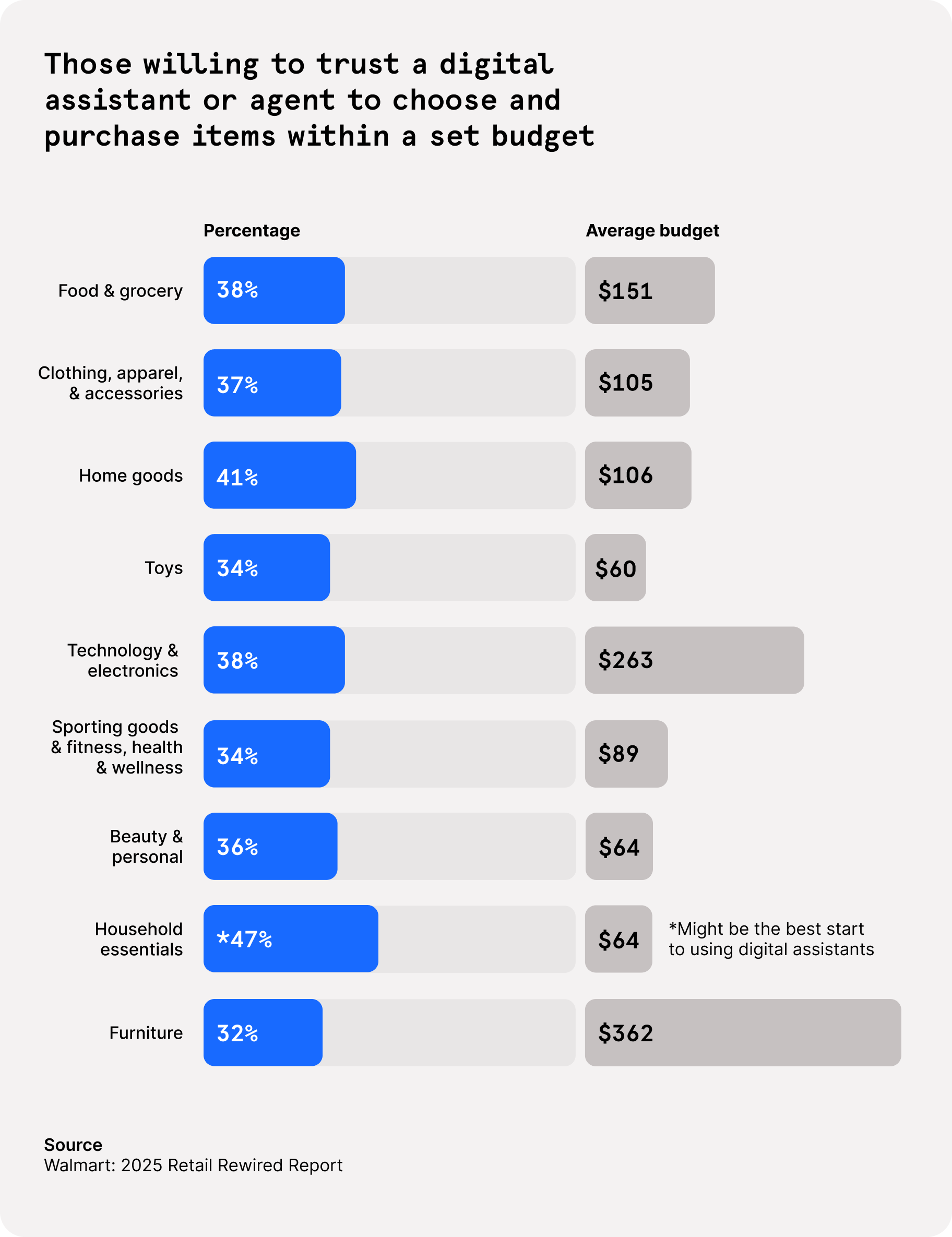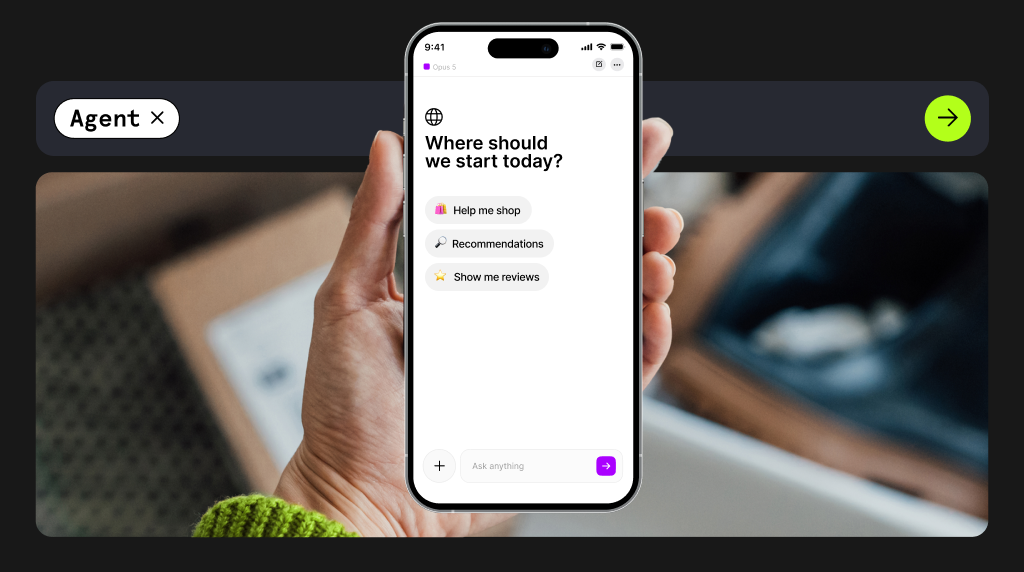AI agents are already reshaping the way people discover, choose, and buy. In agent-led shopping, they take care of everything from finding products and comparing options to completing the purchase. But not every shopping journey is ready for automation.
The most agent-ready experiences tend to be high-friction, admin-heavy, or infrequent. That might mean checkout flows with too many steps, booking processes full of repetitive data entry, or purchases that happen so rarely they require starting from scratch every time.
As ecommerce is rapidly becoming the preferred shopping method, customers have come to expect fast, smooth interactions from merchants. AI has only raised the bar – driving demand for personalized experiences, real-time interactions, and always-on support.
Retail is entering the agent era
There’s no single playbook for agent-led retail. But whether powered by ChatGPT, Google, or TikTok Shop, one thing is clear: agents will respond to natural language. They’ll ask clarifying questions and act on intent.
- “What’s your budget?”
- “What size?”
- “Any preferred brands?”
Across the journey, from discovery to delivery, AI agents are poised to reengineer retail. They’re able to make decisions, take actions, and respond in real time, often with minimal input from the shopper.
Retailers are responding. According to Salesforce, 76% plan to increase AI investment over the next year – particularly in customer service. Agents that handle inquiries, track orders, and manage returns are quickly becoming a priority.
Gen Z is accelerating the shift. Retail Insider says they’re 10 times more likely than baby boomers to use AI for product discovery, and more open to AI-led purchases. But what could be coming next is even more transformative. In the near future, instead of clicking through endless filters, a shopper could describe what they need, and the agent would handle the rest, surfacing the most relevant options only.
Walmart research shows:
- 47% of shoppers would trust a digital assistant to buy essentials
- 69% said speed was a deciding factor in where they shop
- 35% want agents to summarize product reviews
- 33% want a tool that can search across all retailers and categories in one place

The future of online shopping
As AI agents gain trust and capability, they’ll move beyond answering questions to completing entire online shopping trips – from discovery to delivery:
- Compare prices, shipping times, and stock availability across retailers
- Track saved items and alert shoppers to price drops or restocks
- Manage returns end-to-end, from printing labels to arranging pickups
- Present only the best-fit products, based on individual preferences and past behavior
AI agents are revealing a new phase of ecommerce, one where shopping journeys are intuitive, efficient, and more personalized than ever before. It’s a shift explored in detail by Rami Josef, Product Director at Checkout.com, in his article on agentic commerce.
Business travel: Reclaim time, reduce risk
Booking business travel has never been simple. Policy rules, budgets, loyalty schemes, and shifting itineraries make it hard to get right. It’s no wonder only 56% of business travelers use their company’s preferred booking tool. The rest look elsewhere for simpler experiences, increasing compliance, cost, and duty of care risks for employers.
From planning to booking, in one step
Instead of comparing options manually, travelers could ask an AI agent to plan their trip. Tools like Otto already create personalized itineraries that account for company policy, loyalty programs, and personal preferences. Otto says it can learn your travel habits and suggest options based on your past preferences and patterns.
According to Amadeus Hospitality, over half of business travelers would trust AI to manage the full booking process. And 90% of travel managers are actively deploying AI tools to simplify travel admin.
But the opportunity goes beyond booking. Roughly 20% of business travel expense reports contain errors and take 20 minutes each to process. AI agents could cut that down dramatically by syncing calendars, capturing receipts, and triggering reports automatically.
What this means for merchants
As agents evolve, they’ll move from coordination to collaboration – rebooking flights, notifying hotels, and updating attendees. That demands infrastructure built for agents: resilient, real-time, and ready to connect.
Even now, platforms like AgentSee – a self-service AI tool used by travel agencies – are automating up to 30% of requests submitted through their own portals, even with only a portion of use cases activated. As capabilities expand, that figure is expected to rise significantly.
Why it matters
AI agents could make booking business travel a smoother, cheaper, and more compliant booking process for employers, employees, and merchants alike.
The future is already visible. OpenAI’s ‘agent mode’ for ChatGPT can now plan and book full itineraries – researching options, syncing calendars, and managing budgets. While it’s yet live across most of Europe, it signals what’s next: a world where agents no longer just assist, but negotiate directly on behalf of users.
“In a world where AI agents act on behalf of the traveler, it’s likely those agents will be in constant contact with AI agents representing airlines, hotels, and destination providers,” shares Jay Richmond, Senior Director at Amadeus.
But that shift raises a new question: if agents are doing the searching, comparing, and booking – who are we really marketing to?
Brands will need to optimize not just for people, but for the systems that represent them – with product feeds, reviews, and data structured for easy evaluation by autonomous agents.
Ticketing that clicks before you do
Buying tickets for live events isn’t always easy. Presale codes, limited inventory, and dynamic pricing, all add complexity to what should be a simple shopping experience. For merchants, every added step increases the risk of drop-off, especially in these high-intent, high-pressure moments.
Most fans know exactly what they want: a seat, in a location, at a price they can justify. Getting there, though, still means bouncing between tabs and racing the clock. And by the time you’re ready to buy, the best spots are often gone.
Agents that act, not just assist
AI agents could minimize the stress in ticketing. Set your preferences once – price, location, dates – and the agent takes it from there. It could check availability, book as soon as your criteria are met, and deliver the tickets straight to your digital wallet.
Some platforms are already testing this. Alexa’s new agent mode lets users link their Ticketmaster account, request tickets, confirm quantity, and breeze through to checkout – with pre-filled details and one-tap purchase. It’s not fully autonomous yet, but the trajectory is clear.
And when platforms do enable full agent-triggered purchasing, the results could be transformative: fewer abandoned carts, faster conversions, and far less friction for fans and merchants.
A new interface for discovery
Eventually, fans may skip browsing altogether. Just tell the agent what you want, and it finds the match. That kind of shift puts pressure on platforms to evolve, with real-time inventory, flexible search, and agent-ready APIs. Those who adapt early could become the most visible, most bookable names in the space.
Done right, ticketing could move to the background – automated, personalized, and always ready the moment fans are.
This kind of zero-click, agent-led journey isn’t unique to ticketing, it’s reshaping how people search, choose, and buy across each category. Explore how this is changing the rules of marketing in agentic commerce.
Insurance: zero-click confidence
Insurance is complex. For customers, it’s hard to know what’s covered, what’s not, and whether they’re getting value. For insurers, it’s a world of risk modelling, data gaps, and operational drag. AI agents could help change both sides.
For consumers, AI agents could act as intelligent guides. Instead of scrolling through filters, a user could describe their preferences, and the agent would return a personalized shortlist with clear, simple explanations.
For insurers, generative AI is improving how policies are built, sold, and serviced. From synthetic data that sharpens risk modelling to always-on chatbots that speak plain language, it’s a chance to improve both operations and experience.
A UserTesting survey found:
- 36% of consumers already turn to AI to decode complex insurance information
- 33% want help comparing plans
- 25% want clearer, simpler coverage terms
“Consumers are increasingly embracing AI to demystify insurance policies.” says Bee Nookala, Principal Marketing Manager, Insurance Solutions at UserTesting. “Many trust AI to offer more privacy and unbiased advice than a human agent. It’s clear that AI is poised to play a crucial role in transforming the future of insurance, but it’s equally important that companies balance this with the human touch customers still crave.”
Where it’s starting to show
Microsoft is building multi-agent systems that extract claims data and manage policy workflows without human input. Charles Taylor InsureTech has launched autonomous AI agents that assess claims and verify documents, without human intervention. And UnlikelyAI – founded by one of Alexa’s original inventors – has completed a pilot with SBS Insurance Services which saw the insurer automate 40% of its claims handling with 99% accuracy.
For buyers, this could mean fewer forms, faster answers, and coverage that fits. For insurers, it’s a pathway to lower drop-off and stronger retention.
When agents shop, will they choose you?
Not every journey will be agent-led overnight. But the journeys we’ve explored show where the value is most immediate.
Retail, business travel, ticketing, and insurance all share the same hallmarks: complexity, friction, and opportunity. These are the pressure points AI agents are built to relieve – collapsing steps, boosting speed, and making experiences smarter for everyone involved.
For merchants, the rewards are clear. Higher conversion, lower cost, and greater satisfaction. But only for those who adapt early and build infrastructure that speaks to agents as well as customers.
As agents begin to take over the purchase journey, the question isn’t just whether your experience works for people, it’s whether it works for the agents acting on their behalf.
To stay on top of the trends shaping this shift, visit our agentic commerce hub for the latest thinking, use cases, and updates.






.png)






_How%20and%20why%20to%20launch%20a%20card%20program%20(1).png)


